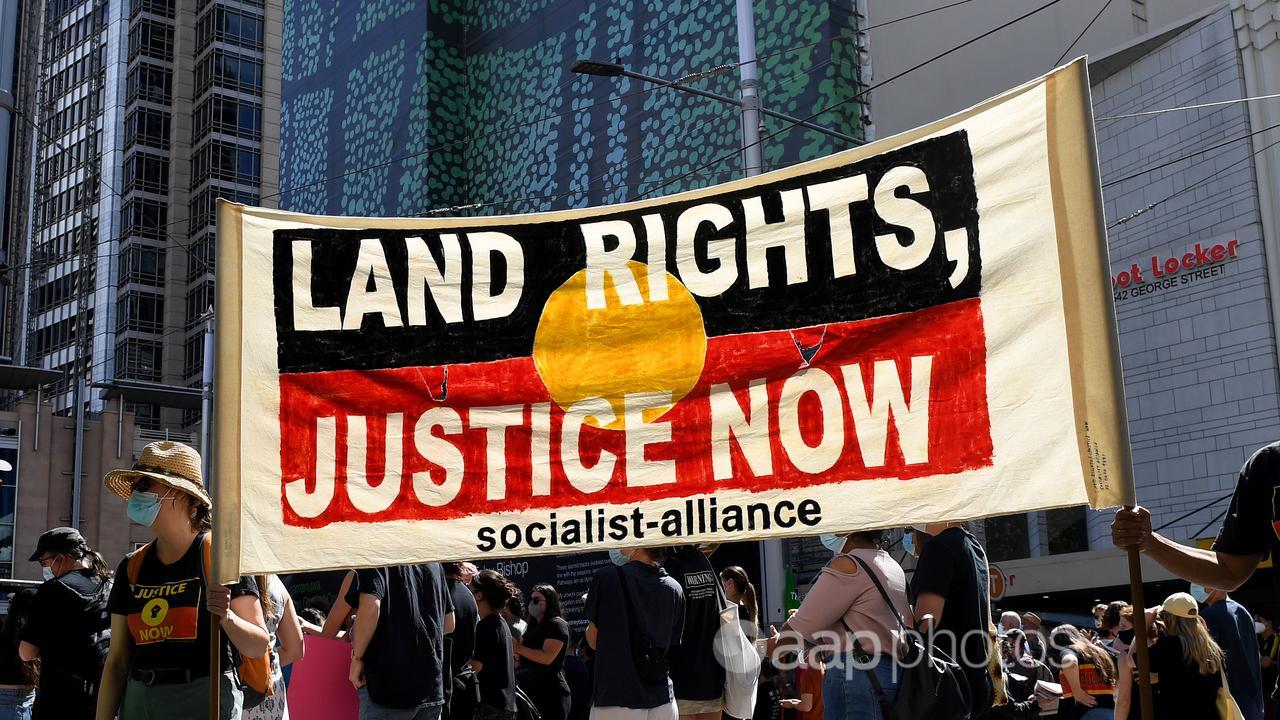A viral video claims Indigenous Australians’ hard-won land rights will be lost if they are recognised in the constitution.
This is false. Experts told AAP FactCheck constitutional recognition as part of the Aboriginal and Torres Strait Islander voice to parliament would not affect land rights.
They say it may even strengthen the position of Indigenous Australians when it comes to future negotiations on land rights.
The claim was made in a Facebook video (screenshot here) which has been viewed hundreds of thousands of times.
The Indigenous woman in the video claims that by being recognised in the constitution “we will lose … our rights over our tribal lands,” (video mark 7min 20sec).

She then says Indigenous sovereignty will be ceded to a “corporation”, before adding: “We’re up against a foreign corporation that is running this country,” (video mark 7min 38sec).
It’s not clear what she is referring to when mentioning corporations running Australia, but it’s a constant theme of the sovereign citizen movement.
AAP FactCheck has debunked related claims, see here and here.
Her claim about the loss of land rights under the voice is also false.
As explained in other fact checks (see here, here and here), the proposed voice would be an advisory body which would make representations to parliament and executive government on matters relating to Indigenous Australians.
Experts have told AAP FactCheck this was confirmed by the wording of the proposed constitutional amendment, which would be added to the constitution if the ‘yes’ vote succeeds at an upcoming referendum.

It is unclear if the speaker is referring to the loss of legislated land rights, common law recognition of native title or both. Whatever the claim is related to, experts told AAP FactCheck it is false.
It is also unclear how exactly she is suggesting Indigenous land rights will be lost. In other videos she has posted claims relating to the United Nations and a supposed land grab by “global elites” – a claim previously checked by AAP FactCheck, see here.
University of Sydney professor emerita of constitutional law Anne Twomey blamed the “destructive influence” of US sovereign citizens for some of the video’s content.
“None of it is true, but the sovereign citizens movement has clearly infiltrated some Indigenous communities in Australia,” Professor Twomey told AAP FactCheck.
She said existing legal rights with regards to land comes from land rights legislation or common law recognition of native title, both of which apply under the constitution.
“The proposed amendment does not involve any alteration to those laws or rights,” Prof Twomey said.
Associate Professor Harry Hobbs, a constitutional law and human rights expert at the University of Technology Sydney, agreed.
Dr Hobbs told AAP FactCheck the proposed amendment would have “no effect on land rights”.

Gabrielle Appleby, a law professor at the UNSW Sydney, said the voice would be an active step in recognition of Indigenous Australian history, their connection to the land and culture.
“In that respect it is consistent with, and a continuation of, recognition that has occurred in land rights legislation and cases such as Mabo (No 2) (1992) and Love v Commonwealth; Thoms v Commonwealth (2020),” Prof Appleby told AAP FactCheck.
She said the voice could even help strengthen the position of Indigenous Australians in any future negotiations.
“The voice will give Aboriginal and Torres Strait Islander people a greater say in the development of policies and laws that affect them, which means that in the future development and amendment of land rights legislation, Aboriginal and Torres Strait people will have a vehicle to speak collectively to government and parliament to make sure those amendments strengthen, and don’t weaken, land rights, and meet the aspirations of traditional owners,” Prof Appleby said.

The video also makes several claims about the ceding of sovereignty in connection with the supposed loss of land rights.
Prof Twomey said the voice had no connection to ceding sovereignty as this could only happen by way of an agreement, such as a treaty.
Prof Appleby said the voice proposal comes from the Uluru Statement from the Heart, “which is grounded on a strong assertion of continuing and unceded sovereignty”.
The Verdict
The claim Indigenous Australians will lose their land rights if they are recognised in the constitution is false.
Experts told AAP FactCheck the proposed constitutional amendment, which will recognise Indigenous Australians as the first peoples of Australia and enshrine a voice to parliament, has no effect on land rights.
False – The claim is inaccurate.
AAP FactCheck is an accredited member of the International Fact-Checking Network. To keep up with our latest fact checks, follow us on Facebook, Twitter and Instagram.
All information, text and images included on the AAP Websites is for personal use only and may not be re-written, copied, re-sold or re-distributed, framed, linked, shared onto social media or otherwise used whether for compensation of any kind or not, unless you have the prior written permission of AAP. For more information, please refer to our standard terms and conditions.


















